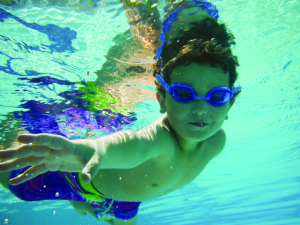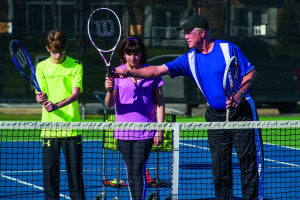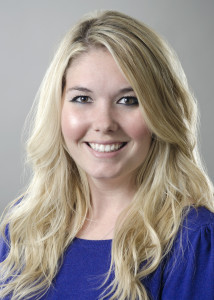This post has been sponsored by Cooper Fitness Center in Dallas. All opinions are 100% our own!
Now that you’ve selected your camp after asking all the right questions, what’s next? Think about what you want that camp to know about your child. Realize the important role you play in making the summer camp experience a positive one for your child by communicating with camp professionals about your child prior to the first day of camp.
Parents often wonder why we at Cooper Fitness Center ask for such personal information for camp and why each year they have to complete all of the forms again. When you entrust your camper in our care, you recognize that our camp goals for your child’s safety and happiness align with your own goals. Everything from former camp experiences to your child’s favorite activities to behavior patterns or issues can help paint a clearer picture of the best way camp can accommodate them during this exciting adventure. These details forge partnerships between the camp representatives and parents in providing success and happiness for each camper, so it’s crucial to offer the most current snapshot of your child.
Communication is KEY! Don’t hesitate to share as many details as possible. At Cooper Fitness Center, we request information in our medical form regarding your child’s physical, mental, social and emotional development to help get to know your child better and prepare for their arrival.
 1. What are your child’s strengths or preferred activities? Does your child excel at high-paced, energetic activities – like running, water play or tag? Or is he/she more in tune with activities like board games or arts and crafts? Is he/she more outgoing or reserved? How does he/she transition from a familiar environment to a new environment?
1. What are your child’s strengths or preferred activities? Does your child excel at high-paced, energetic activities – like running, water play or tag? Or is he/she more in tune with activities like board games or arts and crafts? Is he/she more outgoing or reserved? How does he/she transition from a familiar environment to a new environment?
2. What goals do you have for your child at camp? What are you expecting from your child after the camp session? What does your child hope to gain from this experience? Maybe you want to see increased independence or confidence, or are looking to develop a skill – like improve swimming strokes. Does your child just want to have fun or socialize? Knowing all these expectations in advance will lend itself to a happier outcome for all parties.
3. Has your child been diagnosed with a condition that affects his learning (ADHD, sensory processing/sensory integration, learning difference, dyslexia, etc.)? Or a disorder such as autism or Asperger’s syndrome? Many times parents don’t think they would need to inform a camp of their child’s dyslexia, as that only affects their schoolwork. However, this information should absolutely be included. What if your child is participating in an orienteering event or expected to follow written instructions for a craft project? If camp professionals know in advance, they can modify the activity to give oral instructions instead of written directions to assist that camper.
4. Does your child take any medication for behavior, learning, mood or attention? If so, what medication and when do they take it? It’s important to provide a detailed list of your child’s medications, appropriate times to administer and instructions if your child misses a dose.
5. Describe previous camp experiences (or other youth programs) and environments your child has participated in. A negative experience at any camp can make a child apprehensive, despondent about attending camp in general and wanting to give up before he/she even tries the new experience. This is where a pre-camp discussion with the camp director can prepare the new camp team to look for signs of concern and help shape a positive experience this time.

6. Are there any other medical, behavioral, emotional or physical notes that should be shared to help provide a more successful and encouraging environment for your child? Finding a camp that has a team of educated and skilled professionals to provide proper care is your ultimate responsibility. If inclusion is what you are looking for in a camp, don’t be afraid to ask if the camp has experience with providing it. It isn’t fair to your child, the other campers or camp team caring for your child to surprise them on the first day with a list of additional medical needs or physical accommodations.
7. Any additional recommendations you would like to share to help provide a better camp experience for your child?
Running my 10th year of summer camp, I have seen examples of parents eliminating the opportunity for camp or youth development professionals to work as a team to provide a happy, safe environment and potential for the camper to fully enjoy the benefits of camp. Sometimes a parent will share crucial information but not until the night before or the first day of camp, which eliminates the chance to prepare and provide accommodations as needed. In some cases, I have had to tell parents our camp isn’t set up for the accommodations requested, and the parent is then left without a camp for their child that week. All of these issues could be avoided if the appropriate information is shared at the time of registration and a partnership is created between the parent and camp professional. These tips should transcend to any youth program your child participates in and will ultimately help him reach his full potential in the appropriate environment.
If you’re interested in learning more about day camp options at Cooper Fitness Center (and the added bonus for parents!), visit their website or request more information using their online form.
Find Cooper Fitness Center on Facebook & find Cooper Aerobics on Facebook & Twitter.
* * * * *
 Meredith Rosson is the Assistant General Manager of Cooper Fitness Center. Meredith studied Exercise Physiology at University of Texas at Austin and has played an integral role in developing the Cooper Youth Programs since 2006.
Meredith Rosson is the Assistant General Manager of Cooper Fitness Center. Meredith studied Exercise Physiology at University of Texas at Austin and has played an integral role in developing the Cooper Youth Programs since 2006.
Download the full Youth Programs Guide and register online at cooperyouth.com/Dallas.
**This post has been sponsored by Cooper Fitness Center to bring you information about summer camps. All opinions are 100% our own!













